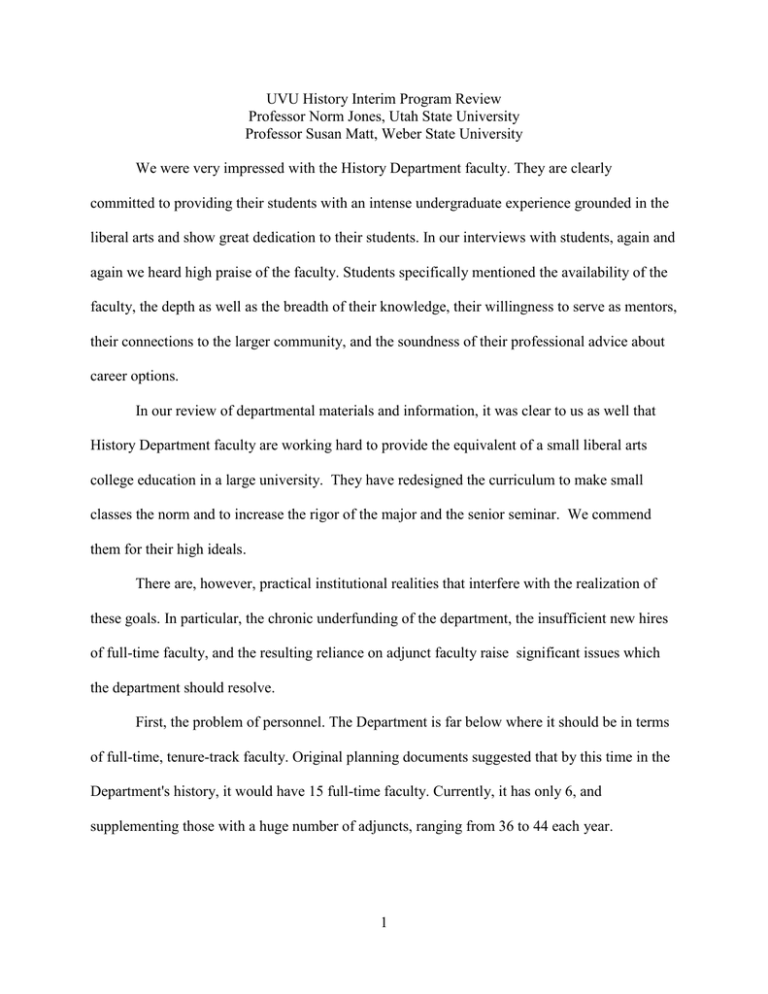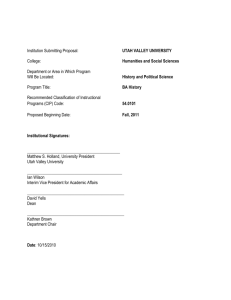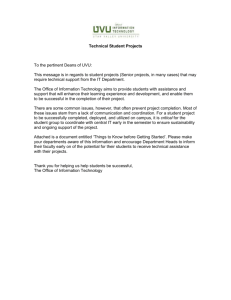UVU Interim Program Review
advertisement

UVU History Interim Program Review Professor Norm Jones, Utah State University Professor Susan Matt, Weber State University We were very impressed with the History Department faculty. They are clearly committed to providing their students with an intense undergraduate experience grounded in the liberal arts and show great dedication to their students. In our interviews with students, again and again we heard high praise of the faculty. Students specifically mentioned the availability of the faculty, the depth as well as the breadth of their knowledge, their willingness to serve as mentors, their connections to the larger community, and the soundness of their professional advice about career options. In our review of departmental materials and information, it was clear to us as well that History Department faculty are working hard to provide the equivalent of a small liberal arts college education in a large university. They have redesigned the curriculum to make small classes the norm and to increase the rigor of the major and the senior seminar. We commend them for their high ideals. There are, however, practical institutional realities that interfere with the realization of these goals. In particular, the chronic underfunding of the department, the insufficient new hires of full-time faculty, and the resulting reliance on adjunct faculty raise significant issues which the department should resolve. First, the problem of personnel. The Department is far below where it should be in terms of full-time, tenure-track faculty. Original planning documents suggested that by this time in the Department's history, it would have 15 full-time faculty. Currently, it has only 6, and supplementing those with a huge number of adjuncts, ranging from 36 to 44 each year. 1 Those numbers are troubling for a number of reasons. First, the quality of adjuncts is uneven, with some possessing only bachelors degrees. Secondly, full-time faculty really should be hired in Asian and Middle-Eastern history, given the Department's course requirments. We urge the Administration to find funding for these positions, and soon. Another problem that results from the small number of full-time faculty is that students are short-changed. The students we talked with raved about the full-time faculty, but said that the adjuncts, while generally good, were often unavailable and pressed for time, and couldn't make the same commitments to students in terms of time or energy that full-time instructors could. Given the number of students and the number of full-time faculty, and given the limitations of the adjunct faculty, we recommend that the Department, at least for the short term, increase the size of its classes. Right now, lower division courses average between 30 and 45, while upper division range from 4-30. The senior seminar is capped at 10. It makes little sense to insist on small classes with the hope of creating a liberal arts college environment and then rely so heavily on adjuncts who are often inaccessible to students. While the goal of small classes is in theory a very worthy one, the way the program is being implemented actually seems to shortchange students rather than benefit them. The caps on lower-division and senior seminar courses seem to be the most obvious ones to raise. A related issue is the size of the major. Currently, 45 credit hours are required for a history major. This far exceeds the number of hours required by other history programs in the state. Weber State, for instance, requires 36 hours for a history major; 39 for a history teaching major, while Utah State requires 36 hours for the history major and 45 for the History Teaching major (but that includes General Education courses specified for History Teaching, such as Pols 1100). We recommend that UVU bring the number of credit hours for a history major in line 2 with other schools. Doing this will solve a number of problems. First, it will at least partially address the staffing issues, since fewer courses must be taught. Second, it will help with scheduling classes. Students commented that because of the limited availability of required upper division courses, they sometimes had to delay graduation. In a similar vein, students made clear their unhappiness with the required "Nature of History" course, arguing that it seemed to have no set curriculum and offered little guidance for their senior thesis. However, this problem may have been addressed by the 2012 redesign of the course. Students also volunteered that they would welcome a class on how to write research papers earlier in the major, for some of the advice they received in their senior year would have been useful earlier in their careers. Finally, we have suggestions regarding the senior thesis. First, we urge that UVU require its history teaching majors to write a senior thesis. This, too, would bring it into conformity with other programs across the state, and would make less likely that students undertake a teaching major merely to avoid the thesis requirement. As the new Utah Core is introduced in the high schools, students preparing to teach history must be taught how to research and write so they can teach those skills. Second, we believe the current thesis committee and defense system, is unwieldy, given the small number of full-time faculty available, so we suggest that it be streamlined It was difficult for us to determine the balance in the Program between straight History majors and History Education majors. This underscores the general issue of data for the major. We could not learn how many students were in which emphasis, and, more importantly, it was unclear if students doing the History Education track were being certified to teach and getting jobs. Tracking of students as they enter, move through, and graduate would provide the 3 opportunity for fine-tuning the degrees in History. Importantly, data on retention, time to degree and completion can help make the case for changes in the Program. If UVU has a retention rate of 60%, does the History Program do better or worse? Why? UVU has a 6-year graduation rate of about 25%. How does History compare? Is it helping improve the rate, or is it retarding the rate? Another question that better data might put in relief is the relation between History’s teaching responsibility and the larger University. As we understand it, History provides about 80% of the seats in the required American Institutions courses, even though Hist 1700 is only one choice among three, the other two being Pols 1000 and 1100. That load should, perhaps, be reconsidered, to make it a more balanced distribution of demand. The History faculty is too small to provide the service, which means adjuncts are teaching the course. Some of the imbalance between regular faculty and contingent faculty is not the fault of History per se. At the same time, the Catalog requires History majors to take American Institutions courses. This is a duplication, in the sense that History majors also have to take two more semesters of American history for the degree. At other institutions, History majors automatically get their American Institutions credits within the major because they take Hist 2700 and 2710. Our interview with the librarian and faculty suggests that the Library is not well equipped to support historical research for the senior capstone. The formal allocation for library support is a $10,000 base budget that must cover History, Political Science, International Studies, and the History of Science. Although this is usually supplemented by the Director of the Library with one-time money, it is not enough to keep up a good undergraduate library in History, let alone all these subjects. USU spends about $60,000 a year on History alone. 4 Rightly, faculty request what they want from the library and their requests take priority. The problem is student research, which is not supported very well, because of the lack of primary source collections and databases. The picture is better for journals, thanks to JSTOR, EBSCO, and other on-line services. The greatest weakness in the collection is that it does not support research in non-American history well, and it does not have longitudinal depth. Things like Google Book can help, but the information literacy resources are not in place for a strong history degree. Students and faculty do have on-site access to on-line databases at the BYU Library, but for non-traditional students this may be of little use. At the core of this problem is the changing nature of historical research. We no longer are dependent on printed resources, and anyone trained to do historical research will use the digital databases by preference. Without good databases, students’ training will be deficient. In discussions with the students and the librarian, we found that, although information literacy instruction, taught by librarians, is available for history classes, not all instructors use it. This contributes to the students’ sense that they are unprepared for the Hist 4980/90 capstone. At the same time, the open topic nature of Hist 4980/90 leads students to attempt research papers for which there are poor resources. We recommend that the History faculty work more closely with the librarians to improve student preparation for research, and that they look at the senior capstone from the standpoint of available resources. We were pleased to learn that the Library has a strong relationship with History, and that the Library employees history students as interns. Ideally, the number of library internships should be increased, since there is a clear relationship between internships and future employment. 5 It appears that the advising supplied by the two professional advisers in the Department is strong. Students seem pleased by it, and the advisers are working hard to help the students become more intentional in their use of the curriculum. The student to adviser ratio is, however, very large, at about 430:1 (this includes Political Science students as well as History students). Although students are very positive about the advising they receive, they do not find selfadvising easy. They would benefit from a “roadmap” that suggests when to take what, and when particular courses will be offered. This non-traditional student body has many personal issues that would be made easier by a better articulated curriculum. It would also help them if summer courses were available. Some of the issues we have identified are about money, and there is no expectation of more money to fix the problems soon. The “missionary recession” is forcing further budget cuts, so expecting more cash in the future is unrealistic. The only way in which this might change is for History, as a unified team, to assert its importance in the University’s curriculum. In this modern world, no money will be given to those who only talk to themselves about what they are doing. The history faculty members need to ask more questions about the role they play in the University, and muster the political strength this gives them. We sensed in some of our interviews that there was a feeling that Political Science was more favored than History in the Department. However, the Dean and Department Head make it clear that the budget lines have beendisentangled, and that the units will eventually be separated. Our sense from them was that the internal struggles within History are damaging History’s advancement. 6 The Historians might do a better job of articulating and improving their degrees if they were more closely involved in the History Tuning Project. Utah’s history programs pioneered a “tuned” history degree that has become the model for the American Historical Association’s own degree tuning project. All institutions in Utah, private as well as public, have been engaged in this, and it has had important impacts on our common understanding of what graduates of history programs must know, understand and be able to do. John McFarland has represented UVU in these deliberations, but we believe it is important that History faculty from UVU join their colleagues in these important conversations, conversations that will help them as they think about their future. Overall, we found a History Program with high aspirations and poor resources. The historians know what needs to be done to ensure a quality degree, but in their laudable commitment to doing it, they have overburdened themselves and their students. Since they have never received, and probably never will received, the support promised to their Program in the R401 approved by the Regents when the degree was created, they must ask themselves how to make their degrees more efficient in their delivery, more student friendly, and less dependent on adjuncts. This may mean increasing class sizes and decreasing the number of hours required. This need not hurt quality, and it will make the use of time and resources more efficient. 7


![MATH Appendix F1: Full-Time Faculty/Adjunct Staffing Request(s) [Acct. Category 1000]](http://s2.studylib.net/store/data/011516099_1-a4f22b1b095e4eb6c40e8a30a8ffd37e-300x300.png)